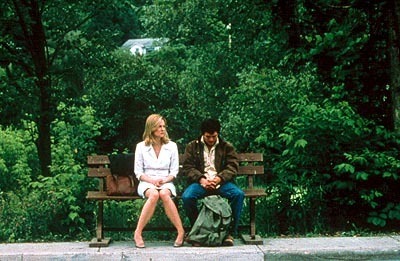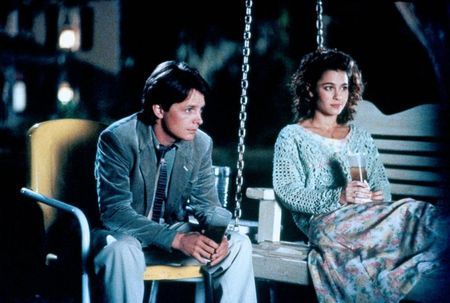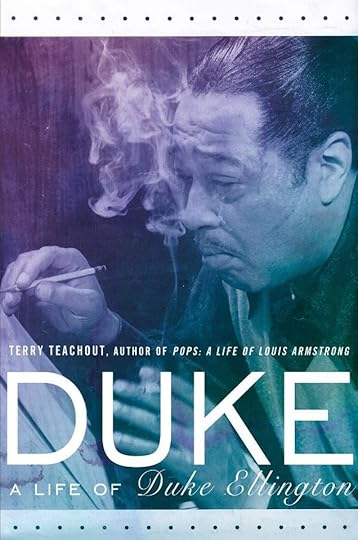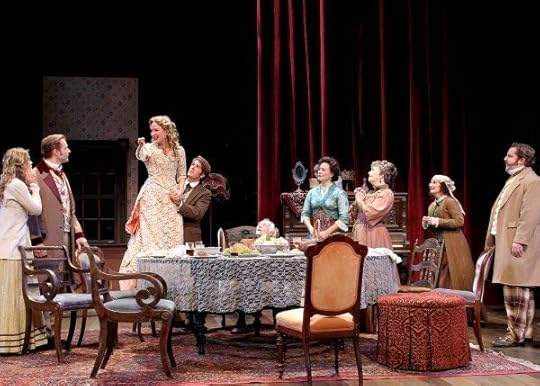Terry Teachout's Blog, page 113
December 16, 2012
TT: What you do see
 As I
mentioned
the other day, I won't be making my customary Christmas trip to Smalltown, U.S.A., this year. I can't remember the last time I spent Christmas anywhere else, but now that my mother is dead, I suspect that it may be quite some time before I return once more to the place where I come from.
As I
mentioned
the other day, I won't be making my customary Christmas trip to Smalltown, U.S.A., this year. I can't remember the last time I spent Christmas anywhere else, but now that my mother is dead, I suspect that it may be quite some time before I return once more to the place where I come from.Such being the case, I find myself inclined of late to prop up my memories of Smalltown with the crutch of fictional representation. Alas, that's easier said than done. "Every great man nowadays has his disciples, and it is usually Judas who writes the biography," said Oscar Wilde. I've noticed something similar when it comes to fictional treatments of small-town life in America, most of which are the work of bright, embittered émigrés who couldn't wait to grow up, move to the big city, and write novels, most of them bad, about how much they hated their childhoods.
I, on the other hand, grew up, moved to the big city, and wrote an affectionate memoir that is mostly about Smalltown, U.S.A., a place that I loved greatly yet still chose to leave, not because I hated my childhood but because I knew that (as I made Louis Armstrong say in Satchmo at the Waldorf) you've got to do what you're made to do. I was made to do things that I couldn't do in a small town, so I went elsewhere to do them. Yet I never stopped loving Smalltown, and it is because of that love, clear-eyed yet enduring, that I find it hard to see the world I knew in the books I read. Only two of them, James Gould Cozzens' The Just and the Unjust and John P. Marquand's Point of No Return , suggest with anything like sympathetic accuracy the real-life town where I grew up.
 For the most part, you have to look to films, not novels, to get a clear sense of small-town life, and it's surprising--or maybe not--how few of the ostensibly serious ones hit the mark at all squarely. By far the most convincing cinematic portrayal of a small town that I know is Kenneth Lonergan's
You Can Count on Me
, a modest little masterpiece that gets absolutely everything right. Peter Bogdanovich's
The Last Picture Show
comes close, but it's too harsh to be entirely persuasive, at least to me.
For the most part, you have to look to films, not novels, to get a clear sense of small-town life, and it's surprising--or maybe not--how few of the ostensibly serious ones hit the mark at all squarely. By far the most convincing cinematic portrayal of a small town that I know is Kenneth Lonergan's
You Can Count on Me
, a modest little masterpiece that gets absolutely everything right. Peter Bogdanovich's
The Last Picture Show
comes close, but it's too harsh to be entirely persuasive, at least to me.When you turn from high art to commercial fantasy, on the other hand, you sometimes find, paradoxical as it may sound, rather more truth. A case in point is Doc Hollywood , David Caton-Jones' 1991 romcom about an arrogant young surgeon (Michael J. Fox) who is forced by cinematic circumstances to spend a week in Grady, a quirkily idyllic rural community somewhere or other below the Mason-Dixon line, where he meets a sly but vulnerable single mother (Julie Warner) whose charms inspire him to settle down in a place that he dismissed at first as "heehaw hell."
Needless to say, Doc Hollywood is no masterpiece, just as Grady and its eccentric residents are far more than a little bit too good to be true--but then, they're not supposed to be true. As Caton-Jones explained in an interview:
[Frank] Capra used to make movies about small towns all the time, and I loved them. You don't realize how seductive American movies are for the rest of the world--and for me, growing up in a little place in Scotland. The movie reflects the way I grew up thinking about America....There are myths that touch internal chords that we don't really understand. If an American had filmed this, I think it would probably have been a lot more skeptical.
That's why Doc Hollywood works, both as entertainment and as truth. Beneath its amiably zany whimsy, it comes closer than any other popular movie I know to embodying the myth of American community. Grady, it seems, is a place whose citizens know, care about, and look after one another, where eccentricity is not merely tolerated but cherished and the absence of big-city distractions makes it possible to pay closer attention to the things that matter most.
 "You don't see a lot of things in Grady, but what you do see, you see a lot of," says Lou, the character played by Julie Warner in Doc Hollywood. She doesn't mean it as a compliment to her home town, about whose cultural limitations she has no illusions, having lived briefly in New York City. At the same time, though, Lou also knows that there's more to life than skyscrapers and concert halls, and so she has consciously chosen to return to Grady and spend the rest of her own life among her own people, even if it deprives her of the man who may be her true love.
"You don't see a lot of things in Grady, but what you do see, you see a lot of," says Lou, the character played by Julie Warner in Doc Hollywood. She doesn't mean it as a compliment to her home town, about whose cultural limitations she has no illusions, having lived briefly in New York City. At the same time, though, Lou also knows that there's more to life than skyscrapers and concert halls, and so she has consciously chosen to return to Grady and spend the rest of her own life among her own people, even if it deprives her of the man who may be her true love.I wrote in September about paying a visit to Spring Green, a tiny Wisconsin town of which I've long been fond:
Something about Spring Green speaks powerfully to me, so much so that my heart lifts each summer when I drive past the city-limits sign. The scale is right, the people agreeable, and there's even a first-class bookstore. If my life were somehow to arrange itself differently--very differently, to be sure--I could see myself living there.
 Whenever I find myself in small towns like Spring Green, I remember how it felt to grow up in Smalltown, U.S.A., where the "myth" of community is in fact a daily reality, one that strengthens and comforts all who participate in it. My mother could never have lived anywhere else, and my brother has never wanted to. I chose another path, one that I've never regretted taking--but you don't have to doubt that you took the right path to know what you missed by taking it.
Whenever I find myself in small towns like Spring Green, I remember how it felt to grow up in Smalltown, U.S.A., where the "myth" of community is in fact a daily reality, one that strengthens and comforts all who participate in it. My mother could never have lived anywhere else, and my brother has never wanted to. I chose another path, one that I've never regretted taking--but you don't have to doubt that you took the right path to know what you missed by taking it.* * *
Michael J. Fox and Julie Warner dance to Patsy Cline's "Crazy" in Doc Hollywood:
TT: All dressed up
 I recently spent a few days in Los Angeles with Steven Lasker, the world's foremost collector of Ellingtonia, who probably knows more than anyone about Duke Ellington. (He definitely knows more than I do.) Not only did Steven allow me to browse freely in his amazing collection, but he made two priceless suggestions. He told me that Duke would be a better title for my biography than Mood Indigo, and he presented me with a little-known Ellington photograph that he thought would make an ideal cover image for the book.
I recently spent a few days in Los Angeles with Steven Lasker, the world's foremost collector of Ellingtonia, who probably knows more than anyone about Duke Ellington. (He definitely knows more than I do.) Not only did Steven allow me to browse freely in his amazing collection, but he made two priceless suggestions. He told me that Duke would be a better title for my biography than Mood Indigo, and he presented me with a little-known Ellington photograph that he thought would make an ideal cover image for the book.It took me about fifteen seconds--maybe thirty--to decide that Steven was right on both counts. I then shot off an e-mail to Bill Shinker, my editor at Gotham Books, who replied instantly and in the affirmative, after which he turned his art director loose. Here are the results, straight off the platen (from whence cometh the strips at the top and bottom of the image--they're not part of the design). We still have a certain amount of tinkering to do, but you'll get the drift.
Few things in life are more exciting, not to mention inspiring, than getting your first look at a preliminary mockup of the front cover of your next book. Now all I have to do is finish writing the thing!
TT: Just because
(This is the latest in a series of arts-related videos that appear in this space each Monday and Wednesday.)
TT: Almanac
Martial, Epigrams
December 13, 2012
TT: The second oldest profession
* * *
One hundred years ago, Arthur Wing Pinero was one of the most successful playwrights of the Vicwardian era. Today he's a footnote, if that. Might it be time to check him out again? Several British companies have mounted Pinero revivals in recent months, and now the Shakespeare Theatre of New Jersey has taken the plunge with "Trelawny of the 'Wells,'" an 1898 backstage "comedietta" (Pinero's word) that hasn't been seen in New York since 1975. I feared that it would be a stale period piece, but I couldn't have been more wrong: "Trelawny of the 'Wells'" is charming and fresh, and this production, staged with total sympathy by Bonnie J. Monte, the company's artistic director, is convincing in every way.
 The title of the play refers to Rose Trelawny (Nisi Sturgis), the spunky young ingenue of London's Bagnigge-Wells Theatre, who has decided to retire from the stage, marry a well-to-do young gentleman (Jordan Coughtry) and renounce forevermore the disreputable ways of "the profession" (as she and her fellow actors call it). No sooner does Rose meet her beau's paralyzingly proper grandfather (Edmond Genest), though, than she finds herself longing for the uninhibited warmth of her old friends, and the comic melodrama that ensues, which was Pinero's specialty, is as delectable now as it was in his own day....
The title of the play refers to Rose Trelawny (Nisi Sturgis), the spunky young ingenue of London's Bagnigge-Wells Theatre, who has decided to retire from the stage, marry a well-to-do young gentleman (Jordan Coughtry) and renounce forevermore the disreputable ways of "the profession" (as she and her fellow actors call it). No sooner does Rose meet her beau's paralyzingly proper grandfather (Edmond Genest), though, than she finds herself longing for the uninhibited warmth of her old friends, and the comic melodrama that ensues, which was Pinero's specialty, is as delectable now as it was in his own day....Ms. Monte understands that the only way to make a play like this work is to mount it without the slightest trace of anachronistically mocking irony. Each member of her 13-person cast obliges, playing "Trelawny of the 'Wells'" absolutely straight. That's what makes it so funny--and touching....
Obsession and good theater don't always go hand in hand. Terrence McNally, for instance, is as obsessed with opera as it's possible to be, yet his two full-length opera-themed plays, "The Lisbon Traviata" and "Master Class," are both uneven in quality. Not so "Golden Age," a comedy about the opening night of Vincenzo Bellini's "I Puritani" that is cunningly made, genuinely moving and--surprise of surprises--entirely accessible to those playgoers whose knowledge of opera begins and ends with Bugs Bunny.
Readers who aren't opera buffs will profit from some preliminary explanation: Bellini (Lee Pace) was a great 19th-century opera composer from Sicily who died at the age of 33, and "I Puritani" (The Puritans) was the last opera he completed. The four stars of its 1835 premiere (played here by Dierdre Friel, Ethan Philips, Lorenzo Pisoni and Eddie Kaye Thomas) were legendary singers whose names are still known to connoisseurs. That's all you need to know, really. Though you'll hear snippets of "I Puritani" playing in the background as Bellini and his singers chat, flirt, quibble and fuss in the dressing room, your attention will be squarely focused on the hijinks taking place before your delighted eyes....
* * *
Read the whole thing here .
TT: Almanac
Jacques Barzun, "Bernard Shaw in Twilight"
December 12, 2012
TT: Almanac
W. Somerset Maugham, Of Human Bondage
TT: So you want to see a show?
Here's my list of recommended Broadway, off-Broadway, and out-of-town shows, updated weekly. In all cases, I gave these shows favorable reviews (if sometimes qualifiedly so) in The Wall Street Journal when they opened. For more information, click on the title.
BROADWAY:
• Annie (musical, G, most performances sold out last week, reviewed here)
• Dead Accounts (serious comedy, PG-13, closes Feb. 24, most performances sold out last week, reviewed here)
• Evita (musical, PG-13, closes Jan. 26, reviewed here)
• Glengarry Glen Ross (drama, R, closes Jan. 20, all performances sold out last week, reviewed here)
• Golden Boy (drama, PG-13, closes Jan. 20, reviewed here)
• The Mystery of Edwin Drood (musical, PG-13, most performances sold out last week, extended through Mar. 10, reviewed here)
• Once (musical, G/PG-13, all performances sold out last week, reviewed here)
• Who's Afraid of Virginia Woolf? (drama, PG-13/R, reviewed here)
OFF BROADWAY:
• Avenue Q (musical, R, adult subject matter and one show-stopping scene of puppet-on-puppet sex, reviewed here)
• The Fantasticks (musical, G, suitable for children capable of enjoying a love story, reviewed here)
• Tribes (drama, PG-13, extended through Jan. 20, reviewed here)
• Vanya and Sonia and Masha and Spike (comedy, PG-13, closes Jan. 13, reviewed here)
IN BOSTON:
• Our Town (drama, G, remounting of off-Broadway production, extended through Jan. 25, original production reviewed here)
CLOSING SOON ON BROADWAY:
• Bring It On (musical, G, closes Dec. 30, reviewed here)
• A Christmas Story (musical, G, closes Dec. 30, nearly all performances sold out last week, reviewed here)
CLOSING SOON OFF BROADWAY:
• The Piano Lesson (drama, PG-13, closes Dec. 30, reviewed here)
CLOSING SUNDAY OFF BROADWAY:
• Giant (musical, G/PG-13, reviewed here)
December 11, 2012
TT: Snapshot
(This is the latest in a series of arts-related videos that appear in this space each Monday and Wednesday.)
TT: Almanac
Israel "Cachao" Lopez (interviewed in Cachao: Uno Mas )
Terry Teachout's Blog
- Terry Teachout's profile
- 45 followers



